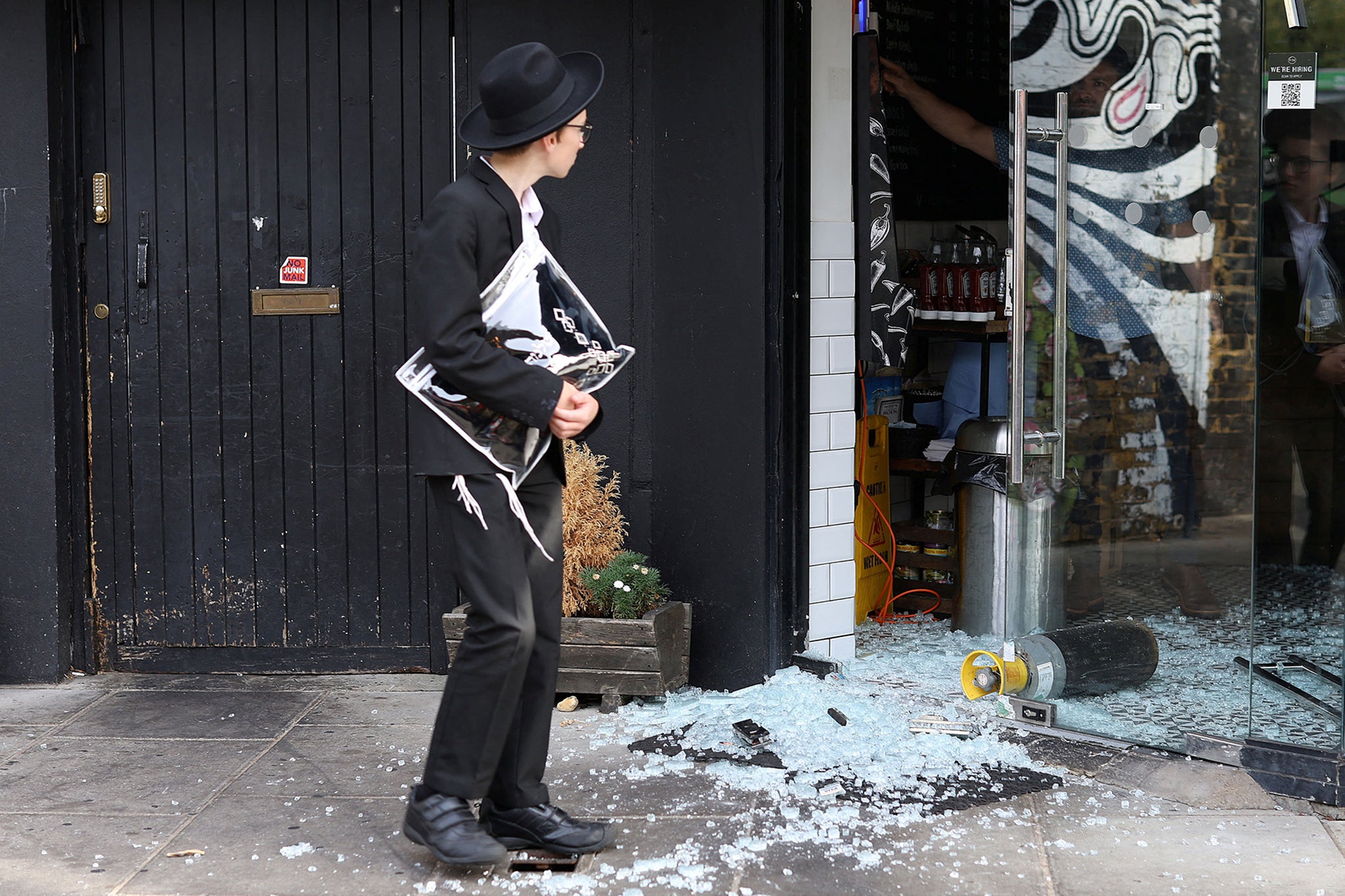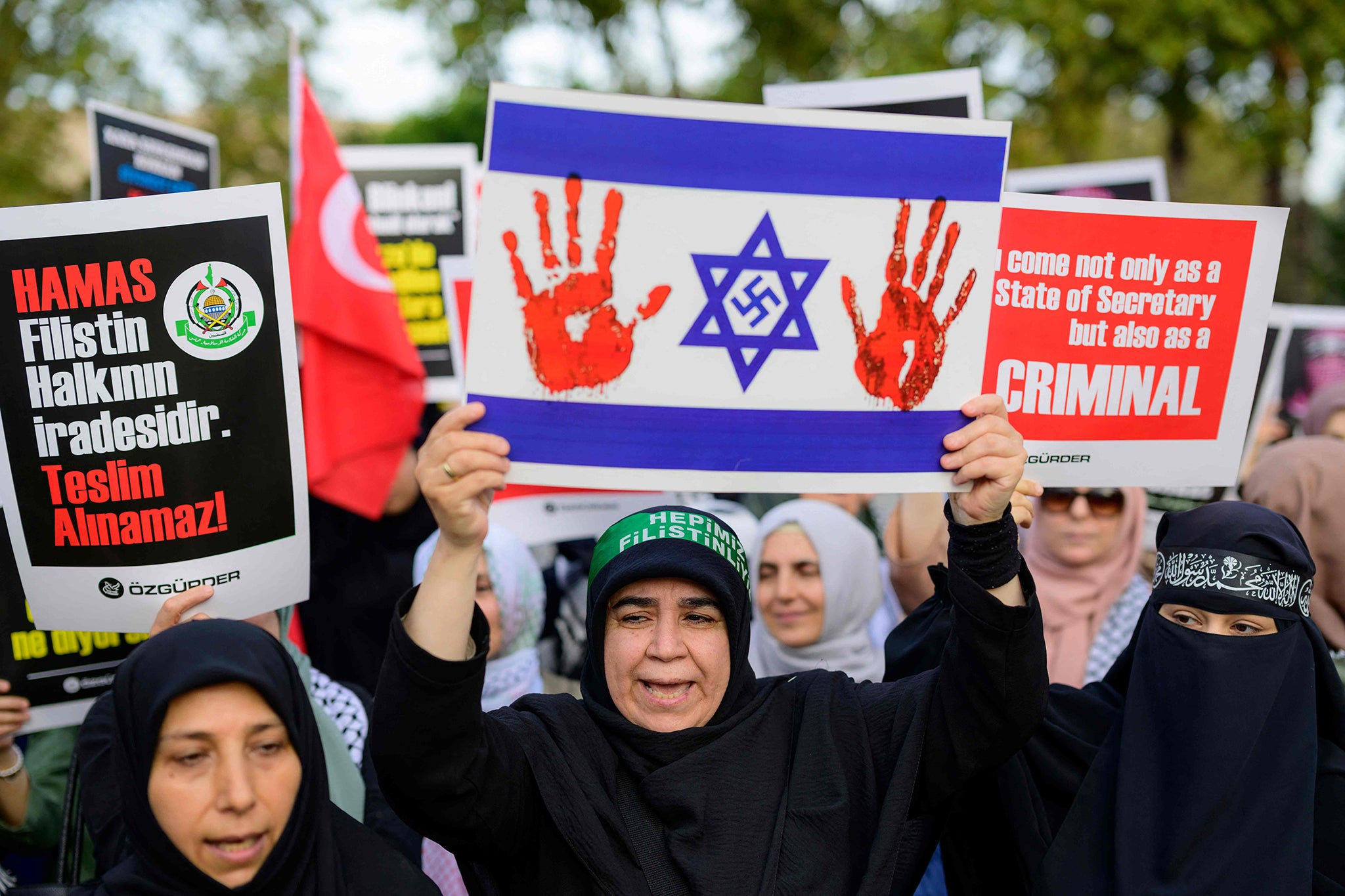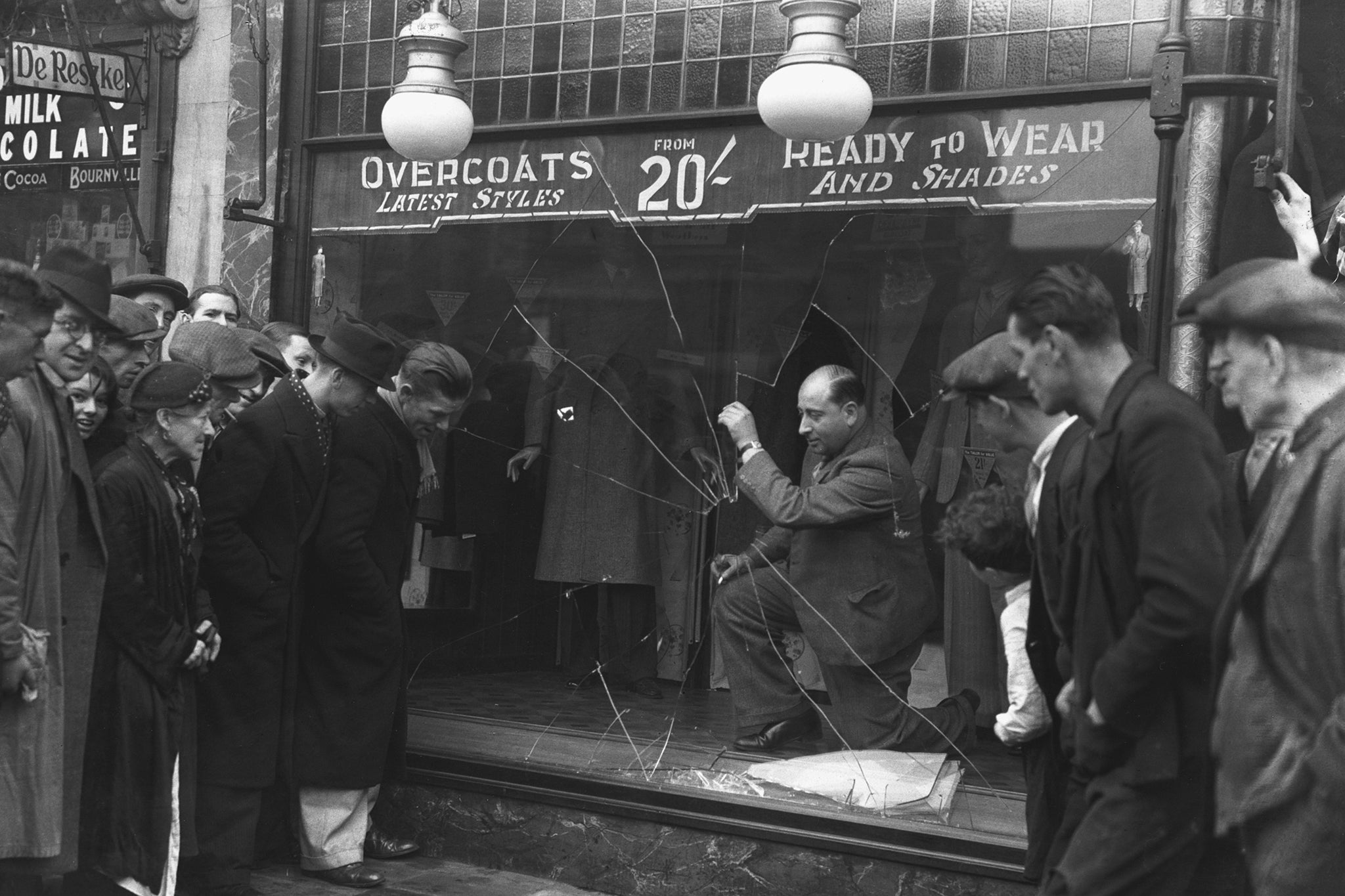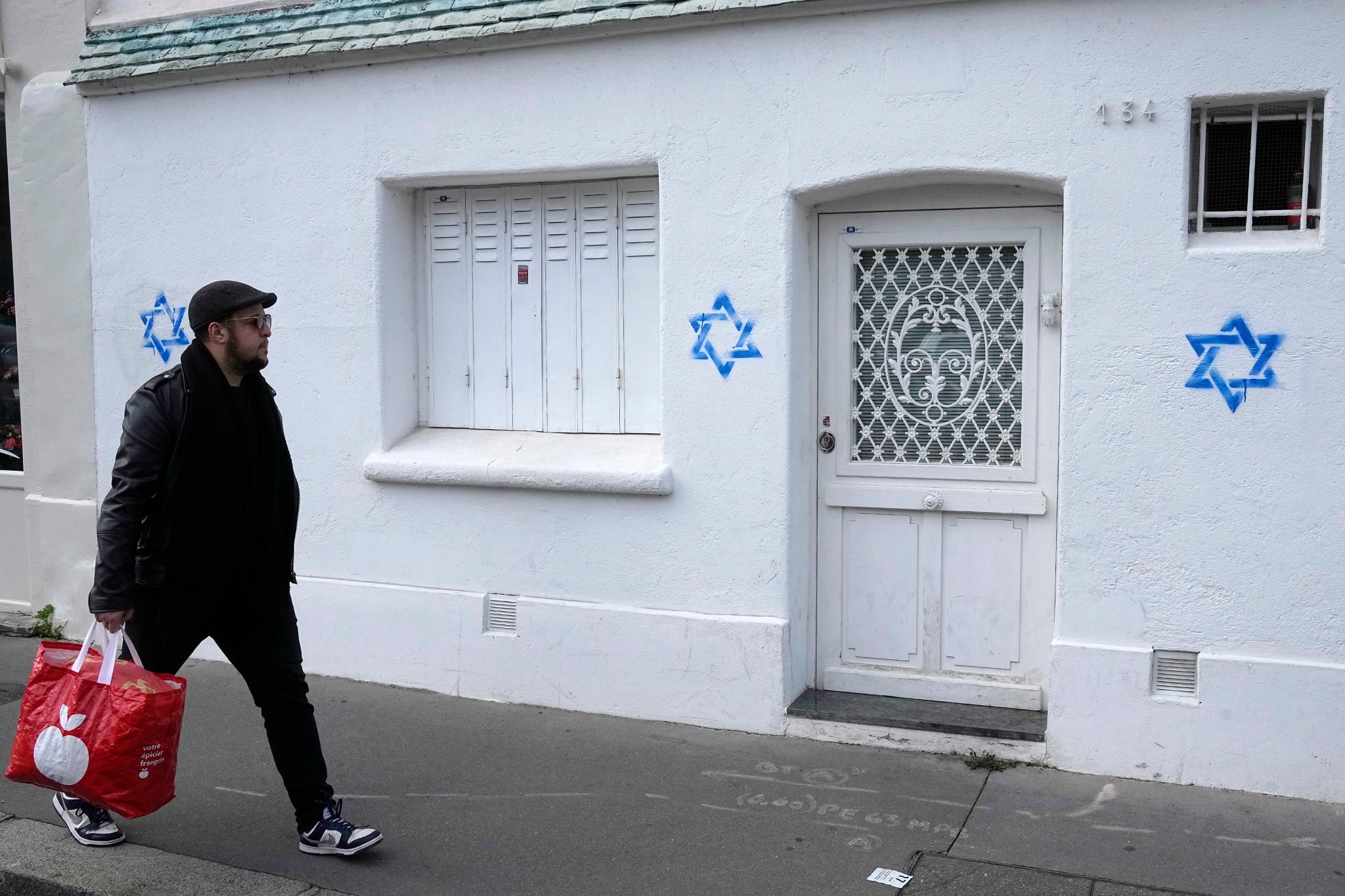What is really driving the new wave of antisemitism?
Reports of antisemitic incidents in the UK reached an all-time high last year with two-thirds of them happening after Hamas’s deadly attack on Israel and the bombing of Gaza. But, says Ben Judah, this says little about Jewish people and more about the way we live now – and the golden age the Jewish diaspora has enjoyed since the Holocaust is coming to an end because of it

My grandmother, a Holocaust survivor, never liked talking about antisemitism. But I was an inquisitive grandson, perhaps uncaringly so, and when I pressed her to tell me a little of her memories about life in Nazi Germany, or occupied France, her answers always seemed to drift away from what it felt like for the Jews, towards what it said about society at large. The sights of mass marches, of humans given numbers, of modernity itself perverted, were what seemed to have shocked her – not that people, as they so often have, could have turned on the Jews.
I have thought a lot about her and her answers since 7 October. Firstly, because it saddens me to remember that when we were having those conversations, nibbling on biscuits in her overheated apartment, I felt that pogroms or any real danger to diaspora Jews were a thing of the past. My questions, I felt, were historical. That these terrible things had belonged to her life and not to mine. And secondly, because since the massacres, it is now obvious, we are living through an antisemitic wave. One which says little about Jews but a lot about the way we live now.
Analysing antisemitism, like the scan of a disease, reveals which of society’s organs have grown sick. The hate my grandmother encountered in the 1930s pulsed through European society, revealing its weaknesses: its carriers, in the age of mass production, were mass parties, and its mindset, in the age of classification, was biological racism. Antisemitism, far from offering a picture of the Jew, offered instead a picture of the German.
And what I see, happening now, is something rather similar. The antisemitic wave that has swept Western societies since 7 October is revealing them for what they are: polarised, internet-buffeted, weak states – struggling with the politics of mass immigration and tensions around universities.
But first, what is happening? A clarification is needed. Israel should be treated like any other country. And that means it is of course legitimate to criticise its actions. Mass protests – entirely fairly – have taken place against American or British military campaigns over the years. This is not what I am talking about.

What I am talking about are the synagogues attacked from Berlin to Tunisia, the Jews stabbed and assaulted from Lyon to Los Angeles, and the Jewish sites forced to shut out of fear from London to Amsterdam. Not only have we seen pro-Palestinian marches – which are in themselves entirely legitimate – filled with antisemitic chants, placards and slogans from New York to Paris, but attempted terrorist attacks from the Midwest to Brazil, and even a near-run pogrom in an airport in Dagestan. The sad truth is fully enumerating these incidents since 7 October would read more like a Wikipedia list than an essay.
Meanwhile, online, we have seen an explosion in viral hate speech, trending conspiracy thinking and Instagram-story massacre denial, accumulating millions of shares, likes and reposts. This has in turn been swallowed up by the culture war raging not only in Britain, but from Germany all the way to Australia, many of whom have an interest in fanning all our fears.
In the universities, that intermediary zone on the way to real life, there has been, mostly in America, an almost daily series of altercations, massacre denials, or professorial statements that have shocked the Jewish community. And in an internet society, all this is being refracted and multiplied, through non-stop social media shares, comments and reposts.

To understand how these events are bouncing off each other, look no further than Montreal. Over the past few days a synagogue and a Jewish community centre were hit by attempted firebombings and bullets were fired at two Jewish schools overnight. Meanwhile, at Concordia University, altercations between students led to multiple arrests and injuries, with a professor caught on camera yelling at a Jewish person to “go back to Poland”.
The idea that any of this constitutes legitimate protest against Israel’s defence forces is absurd. These are attacks to intimidate a local Jewish community over five and a half thousand miles from Gaza. And since, each of these incidents has flown around the Jewish diaspora by social media with the question: is this coming to us next?
But in Montreal, like elsewhere, the old figures of 1930s antisemitism in this – the state, political parties or charismatic leaders – feel almost absent. No Canadian political parties, politicians, trade unions, or mass membership organisations of any kind endorse this. Instead, this leaderless, spontaneous eruption is coming largely out of the internet and feeding off the internet-heightened emotions of the over 10 per cent of the city which are recent Muslim immigrants.
Rather than an overbearing 20th-century European state seeking uniformity to bring down antisemitism, the Canadian state looks like a typically weak, Western 21st-century one unable to stop it. This is how antisemitism is happening, as in the 21st century this is how a lot of social politics happens, from Black Lives Matter to mass Covid conspiracism.

But the traditional grammar of antisemitism feels insufficient to explain what has been happening at Concordia University. The kind of culture that could have led to such intense altercations and a professor being part of the melee can only in part be explained by the intensity of feeling over the terrible scenes in Gaza. Since 7 October, across North America – coast to coast, from Columbia to the University of California, Los Angeles (UCLA) – universities have become ongoing flashpoints.
But the bigger story isn’t that many Jews feel on numerous occasions legitimate criticism of Israel on campus has strayed into antisemitism. It is that more broadly, humanities departments have become – for better or worse – the seats of an increasingly radical rejection of the old American internal and global order. And Israel – rightly or wrongly – is a cypher for it.
Antisemitism is also exposing new online cultures on the political extremes. This is another way we are very much not in the 20th century but firmly in the 21st. The old post-war ideologies of mass society, from the soft class politics of the old left to the soft nationalism of the old right, which saw the diaspora flourish, have been fading away.
Even though their names, logos, and even slogans may have been recycled, the ideologies of today think differently. Reflecting an atomised, internet society of groups and likes, both the radical left and right have embraced a form of identity politics with hierarchies or victims or master races based on ethnicity. And, their very recent history ignored, Jews sit awkwardly in both – seen as both too successful and privileged – and are constantly attacked for their perceived sins.
The trouble with speaking of this as an ideology is that the very word is so 20th century, conjuring images of pamphlets and credentialed ideologues. Instead, these worldviews are better described as online cultures – no less real for being so – distributed between pseudonymous Twitter/X accounts, podcasters or Facebook groups, all claiming an element of irony or activism.
Either way, antisemitism has become embedded in their followers’ and commenters’ attitudes, in a complete inversion of how Jews were seen in early 20th-century hatred. Back then the European imperial world order was seen as something to be proud of by antisemites, Jews were denounced as alien to it and their deaths necessary to save it.

Today, when these radicals have come to hate the American world order, Jews are now seen as symbolic of it. For the most radicalised on the left, a certain conspiratorial way of talking about American Jewish Zionism has taken hold that sees American Jews and their support for Israel as the ultimate cornerstone of a hated, ultimately still-colonial West, that must be done away with. Traumatically for a lot of diaspora Jews, this online culture – in the form of mass likes or posts, not any particular figure – has engaged in either celebrating or denying the Hamas massacres of 7 October.
Meanwhile, for the most radicalised on the right, a mirroring conspiratorial way of talking about American Jewish liberalism has taken over. This sees their support for multiculturalism as the ultimate source of the post-ethnic mass immigration societies they hate and fear will “replace” them.
This kind of discourse today enjoys a mass audience behind “ironic” comedy avatars. And it is a propellant of the building antisemitic wave from the radicalised right that precedes 7 October – measured in growing attacks on Jews since the Pittsburgh massacre of 11 worshipers at a synagogue in 2018 – which is still with us.
But in Montreal – and across the West – we are not going back to the 1930s. Instead, we are accelerating into a new kind of situation for the Jewish community, which reflects the ethnically fragmented and internet-driven societies we live in. The question is: how dangerous is this? Again, the answer has ultimately little to do with the Jews, but is bound up with the question: how much trouble do you think the West is in?
Here it’s important to take stock. The solidarity shown towards Jewish communities by governments and political figures across the West is the key metric. Opinion polls continue to show Western societies as philosemitic, not antisemitic. If your answer – like mine – is despite the turbulence, a vote of confidence in our societies, your conclusion will be that the golden age the Jewish diaspora has enjoyed since the Holocaust might be coming to an end. But we are not going back to the dark age that preceded. Instead, the years ahead promise to be manic and grey.
This piece was first published in December 2023
Join our commenting forum
Join thought-provoking conversations, follow other Independent readers and see their replies
Comments
Bookmark popover
Removed from bookmarks